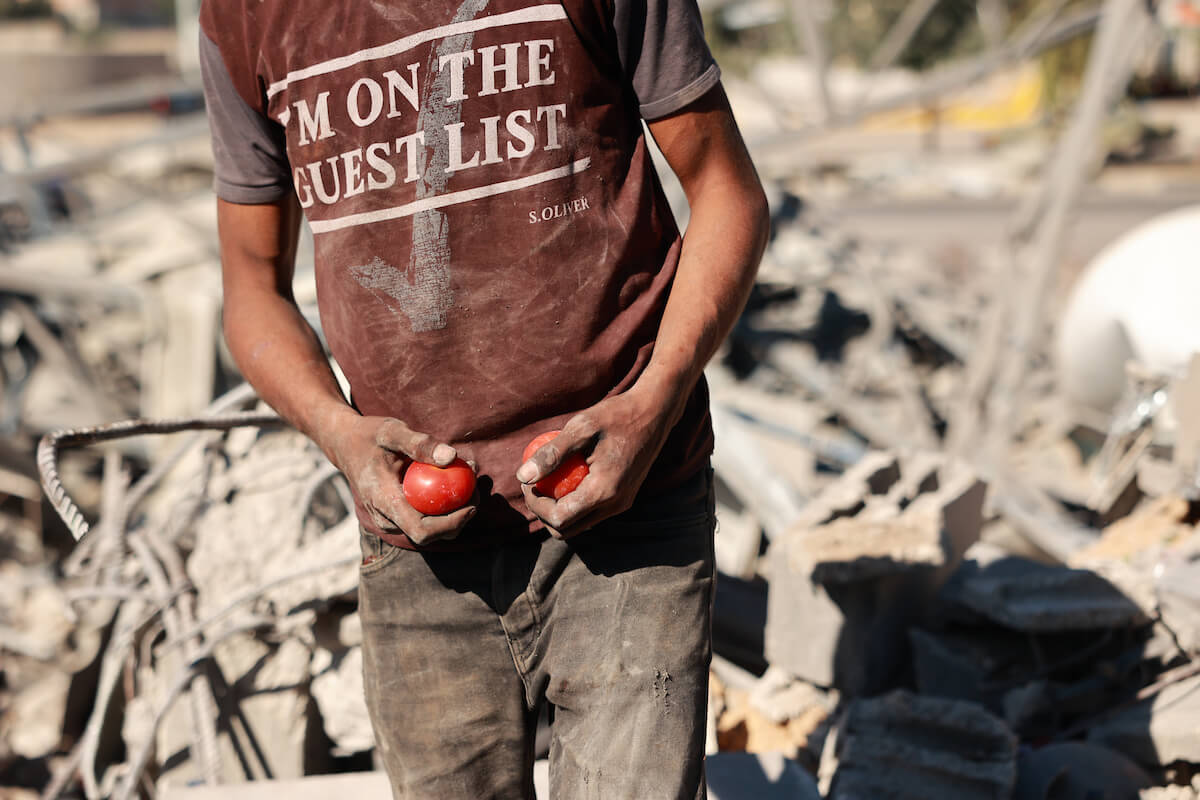On October 12, at the instruction of the Israeli Defense Forces, 20-year-old college student C fled with 50 family members from their homes in Gaza City to the southern town of Khan Younis. I mentor C through We Are Not Numbers, a program that helps young Gazans write essays in English to tell their stories to the world. I’m calling him C because Palestinians in Gaza fear they’ll be targeted by the IDF if they speak out about their conditions.
C felt relatively lucky when he survived his harrowing evacuation and arrived in Khan Younis. His extended family was able to rent a large room where all fifty people slept on the floor with no electricity, running water, or working bathrooms. At least they weren’t stuck in a United Nations school sheltering thousands and had a small amount of money to buy what they needed.
They were able to eat at first. Markets and bakeries were starting to run out of food as they struggled to serve four times the town’s normal population while simultaneously under siege. But C wandered the streets all day, going to every market, and would find something, even if it wasn’t enough. He waited in line at a bakery for three hours one day, four the next, and five the day after to get a few pieces of bread.
Then the wait turned to eight hours with no bread. He and his cousin went out in the cold at three o’clock one morning to try to be first in line, but there were already so many people there that the bakery still ran out before C and his cousin reached the door.
The family worried about starving. They had left behind some nonperishable food in Gaza City when they’d fled, so two uncles risked the drive to get it. They made it there and loaded the car, but when they started back south, the car in front of them was bombed. They turned around. They tried again and again to drive south, never making it far before being shot at or seeing someone killed. And then the IDF stopped allowing people to drive at all. The uncles walked for hours to get back to Khan Younis, unable to carry the provisions they’d risked their lives for. Right after they left, the family home was bombed and reduced to rubble.
Meanwhile, C and the others had resorted to eating chocolate and chips for meals twice a day, as it was all that was left in the stores. Access to clean water had dwindled and disappeared. The children were all sick, and C had excruciating stomach pains.
The next time I reached C, I asked if he was still eating chocolate and chips. His response: “No, unfortunately, we don’t have those anymore.” Was he eating at all? “Don’t worry,” he told me, “I ate today.” His mother, ordinarily a first-grade teacher, had managed to buy a small amount of flour and make a fire with sticks to bake crude bread.
What about the UN aid? The small amount allowed in was dropped at the UN schools, but with over 100 UN workers killed and no remaining government, it was a free-for-all. A few desperate people took more than they needed and sold it to traders for money to buy clothing and blankets to try to survive the winter without heat. That left C and others having to pay traders inflated prices for the aid. C bought an expensive box of UN aid biscuits clearly marked as not for sale. When he pointed out the label to the person selling them, he was told that if he wouldn’t pay for it, someone else would. C bought the biscuits but was running out of money.
Last Thursday, I didn’t know whether C had eaten at all. Communications went dark when the last telecommunications company ran out of fuel. The UN says it had to stop even the small amount of aid it had been sending. Israel wouldn’t allow enough fuel in or guarantee aid workers’ safety.
I don’t plan to eat a Thanksgiving meal this year. And yet, if I eat even one normal meal this Thursday, I’ll likely eat more calories than C will get for the week. I’ll be thankful that I have food, but I’ll be praying for him to get some and for him and his family, including all the children, to survive another day.
At Mondoweiss, we understand the power of telling Palestinian stories. For 17 years, we have pushed back when the mainstream media published lies or echoed politicians’ hateful rhetoric. Now, Palestinian voices are more important than ever.
Our traffic has increased ten times since October 7, and we need your help to cover our increased expenses.
 RSS Feed
RSS Feed















 November 23rd, 2023
November 23rd, 2023  Awake Goy
Awake Goy 
 Posted in
Posted in  Tags:
Tags: 













